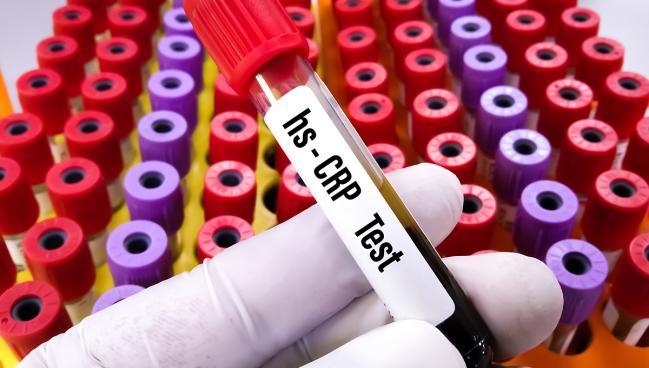Inflammation More Powerful Than LDL as CV Risk Predictor in Statin-Free Patients
Lowering LDL is still key, says Paul Ridker, but a new analysis of CLEAR Outcomes is another reminder that hs-CRP also matters.

In high-risk patients intolerant to statins, inflammation appears to be more influential than cholesterol level when it comes to future risk of CV events and death, according to a new analysis of the CLEAR Outcomes trial.
As reported by TCTMD earlier this year, the main CLEAR Outcomes results showed a significant reduction in MACE with bempedoic acid (Nexletol; Esperion). In the trial, the ATP citrate lyase inhibitor, which targets the production of cholesterol upstream of the enzyme inhibited by statins, was able to reduce CV risk across the spectrum of high-sensitivity C-reactive protein (hs-CRP) and LDL cholesterol levels.
The new inflammation analysis was published online this week in Circulation and will be presented by Paul M. Ridker, MD (Brigham and Women’s Hospital, Boston, MA), next week at the American Heart Association (AHA) 2023 Scientific Sessions.
Speaking with TCTMD, Ridker said the CLEAR Outcomes analysis is in some ways an extension of an earlier one, also reported by TCTMD, which was a meta-analysis of three trials published in the Lancet. “It emphasizes the same major point, which is that while lowering LDL is the most important pharmacologic thing we do, if that’s all we do, we’re not going to beat this disease,” he explained.
“What’s fundamentally different of course is [the first paper] was purposely done on 31,000 people all on aggressive guideline-directed care, including statins,” with the idea that this design would help avoid undermining the importance of statin therapy for patients who need it, Ridker explained.
But some experts at the time questioned that methodology, since the included patients had median baseline LDL levels that were normal, ranging from 75 to 78 mg/dL.
For both analyses, “the results are exactly the same, which is kind of remarkable. It’s not just among statin-treated patients where we have to make sure we target the inflammation. We also have to target the inflammation in people who aren’t on a statin,” said Ridker.
Importantly, he continued, in the footsteps of the US Food and Drug Administration’s June 2023 approval of colchicine—the first anti-inflammatory indicated for reducing CV events—the new analysis “reemphasizes how crucial this entire new pathway is.”
Ridker pointed out that this is all the more timely given the excitement over the SELECT trial, set to be presented in full at the AHA meeting. Like colchicine and bempedoic acid, the glucagon-like peptide-1 (GLP-1) receptor agonist semaglutide (Wegovy; Novo Nordisk) being studied in SELECT, in addition to its other effects, appears to lower both LDL and hs-CRP, he noted, acknowledging that the exact mechanisms driving the benefit with this drug aren’t fully understood.
Still, “perhaps the time has finally come for clinicians to say, ‘Hey, we should have universal assessment of high-sensitivity CRP just like [we do for] LDL cholesterol,’” Ridker suggested. “And maybe this is telling us something very important about how a variety of new agents actually work and how we think about getting them to our patients.”
CLEAR Outcomes, the Sequel
For the current analysis, the CLEAR Outcomes investigators divided the trial’s 13,970 participants into quartiles according to baseline hs-CRP and LDL cholesterol.
Compared with patients in the lowest quartile of hs-CRP, those in the highest quartile had greater risks of the primary endpoint (a composite of incident MI, stroke, coronary revascularization, or CV death), cardiovascular mortality, and all-cause mortality. For LDL, the difference between quartiles was smaller in magnitude for MACE and neutral for both mortality endpoints. Moreover, patients with elevated hs-CRP had increased risks irrespective of their LDL levels.
Highest vs Lowest Quartile: Adjusted HR (95% CI)
|
|
hs-CRP |
LDL Cholesterol |
|
Primary Composite |
1.43 (1.24-1.65) |
1.19 (1.04-1.37) |
|
CV Death |
2.00 (1.53-2.61) |
0.90 (0.70-1.17) |
|
All-Cause Death |
2.21 (1.79-2.73) |
0.95 (0.78-1.16) |
Bempedoic acid reduced both the median hs-CRP level (by 21.6%) and the mean LDL level (by 21.1%) at 6 months compared with placebo. In the overall trial, the use of bempedoic acid decreased the risk of the primary composite by 13% (HR 0.87; 95% CI 0.79-0.96). Hazard ratios were similar for the different strata of hs-CRP and LDL, ranging from 0.85 to 0.95, though the effect of bempedoic acid only reached statistical significance for those with hs-CRP ≥ 2 mg/L (HR 0.86; 95% CI 0.76-0.97) and LDL ≥ 130 mg/dL (HR 0.86; 95% CI 0.76-0.98).
Perhaps the time has finally come for clinicians to say, ‘Hey, we should have universal assessment of high-sensitivity CRP just like [we do for] LDL cholesterol.’ Paul M. Ridker
Importantly, the relative impacts of inflammation and cholesterol on CV death across quartiles were nearly identical between the CLEAR Outcomes analysis and the earlier meta-analysis, Ridker told TCTMD.
The authors conclude: “Vascular inflammation is a major determinant of atherosclerotic risk among statin-intolerant patients in a manner identical to that observed in statin-tolerant patients. These data suggest that targeting low-density lipoprotein cholesterol alone is unlikely to completely reduce atherosclerotic risk and that inflammatory pathways have yet to be fully exploited for patient benefit.”
With the FDA approval of colchicine, “we have an inexpensive, targeted anti-inflammatory therapy that’s being underutilized,” said Ridker, stressing this isn’t a “Big Pharma” situation where there’s a large advertising budget to promote the drug.
Industry has begun to take note of inflammation, however, Ridker added. Looking ahead, he predicted that the Novo Nordisk-sponsored HERMES and ZEUS trials will shed more light on whether targeting inflammation—in these studies, through interleukin-6—can improve CV outcomes.
Caitlin E. Cox is Executive Editor of TCTMD and Associate Director, Editorial Content at the Cardiovascular Research Foundation. She produces the…
Read Full BioSources
Ridker PM, Lei L, Louie MJ, et al. Inflammation and cholesterol as predictors of cardiovascular events among 13 970 contemporary high-risk patients with statin intolerance. Circulation. 2023;Epub ahead of print.
Disclosures
- Ridker reports having received institutional research grant support from Kowa, Novartis, Amarin, Pfizer, Esperion, Novo Nordisk, and the National Heart, Lung, and Blood Institute; having served as a consultant to Novartis, Flame, Agepha, Ardelyx, AstraZeneca, Janssen, Civi Biopharm, GlaxoSmithKline, SOCAR, Novo Nordisk, Health Outlook, Montai Health, Eli Lilly, New Amsterdam, Boehringer-Ingelheim, RTI, Zomagen, Cytokinetics, Horizon Therapeutics, and Cardio Therapeutics; having minority shareholder equity positions in Uppton, Bitteroot Bio, and Angiowave; and receiving compensation for service on the Peter Munk Advisory Board (University of Toronto), the Leducq Foundation, Paris FR, and the Baim Institute (Boston, MA).





Comments